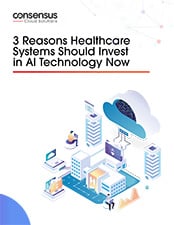Filters
Solution
Collateral Type
Care Setting
Topic
Product
Winning the Healthcare Workforce Battle Will Depend on AI
Winning the Healthcare Workforce Battle Will Depend on AI - Managed Healthcare Executive
It’s the time of year for bold predictions, and in healthcare, it’s an area where artificial intelligence (AI) is taking center stage, with two out of three healthcare executives speculating that generative AI will be a gamechanger for operational efficiency.
This is a prediction driven as much by the hype surrounding breakthrough technologies like ChatGPT as the need for a solution to healthcare’s labor challenges. As a rapidly aging population drives increased demand for care, there aren’t enough clinicians to deliver care in most regions of the country. Add in the prolonged stress of the pandemic and administrative pressures that contribute to rising rates of burnout and you have a recipe for “probably the worst operating environment I’ve seen in healthcare,” as Chas Roades, CEO, Gist Healthcare, and an expert on healthcare strategy, shared during a recent healthcare conference.
It’s a conundrum that AI is primed to address by extending clinicians’ reach, increasing efficiencies at scale, closing gaps in access and improving professional satisfaction. But as a recent KLAS survey of healthcare leaders indicates, determining where to deploy AI solutions remains a top challenge, in no small part due to the cost. Implementing and maintaining these solutions can be expensive, and there’s no guarantee that these investments will yield immediate returns, according to the report.
How can healthcare leaders most effectively lean into AI to overcome the impact of healthcare workforce shortages and retain top talent? Here are key areas to focus on in 2024.
Close the gaps in healthcare information exchange with healthcare’s “digital have nots.”


